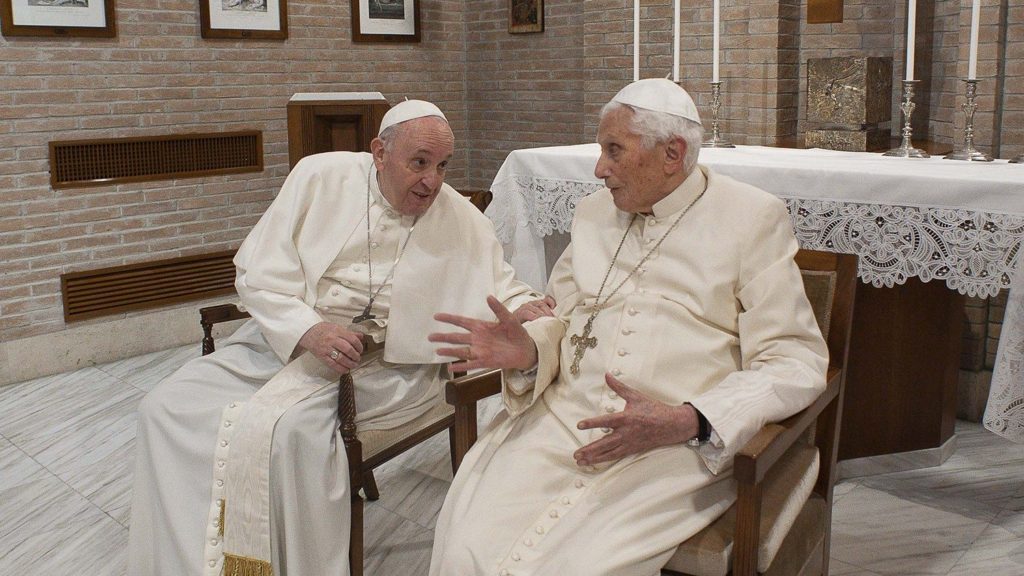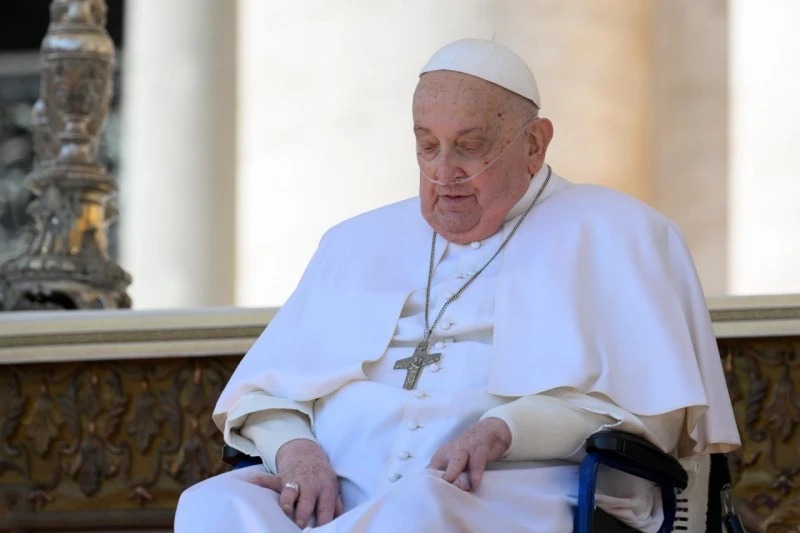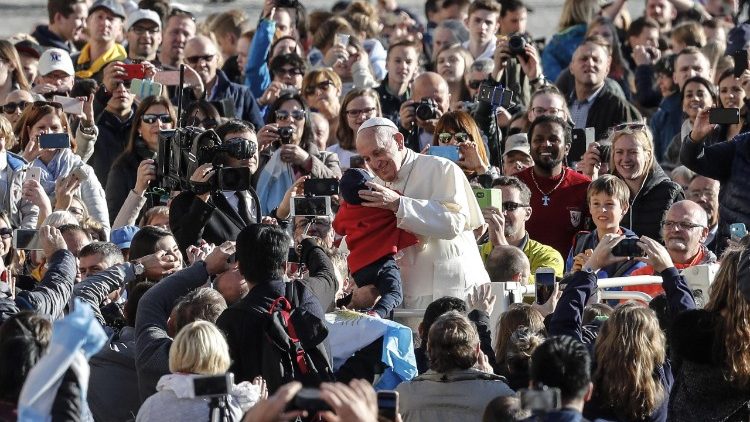Pope Francis Says Benedict XVI Taught Us a Lesson
At General Audience, Pope Francis Also Appeals for Ukraine, Saying 'War Is Craziness'

During this morning’s General Audience in the Vatican, Pope Francis said Benedict XVI taught us a good lesson…
As the Pope continued his series of catecheses on St. Joseph, and specifically this week on him as the Patron of Good Death, Pope Francis recalled: “Pope Benedict said, a few days ago, speaking of himself, that he “is before the dark door of death.”
Francis referred to Benedict’s letter published yesterday in response to the recently published Archdiocese of Munich and Freising’s report on sexual abuse.
Pope Benedict said: “Quite soon, I shall find myself before the final judge of my life. Even though, as I look back on my long life, I can have great reason for fear and trembling, I am nonetheless of good cheer, for I trust firmly that the Lord is not only the just judge, but also the friend and brother who himself has already suffered for my shortcomings, and is thus also my advocate, my ‘Paraclete.’”
In light of the hour of judgment, Benedict said, “the grace of being a Christian becomes all the more clear to me.”
“It grants me knowledge, and indeed friendship, with the judge of my life, and thus allows me to pass confidently through the dark door of death. In this regard, I am constantly reminded of what John tells us at the beginning of the Apocalypse: he sees the Son of Man in all his grandeur and falls at his feet as though dead. Yet He, placing his right hand on him, says to him: “Do not be afraid! It is I…” (cf. Rev 1:12-17),” concluded Benedict.
“It is good,” Pope Francis, “to thank the Pope [Emeritus] who has this clarity, at 95, to tell us this. “I am before the obscurity of death, at the dark door of death”. It is good advice that he has given us, isn’t it?”
Pope Francis warned that he so-called “feel-good” culture tries to remove the reality of death, but the coronavirus pandemic has brought it back into focus in a dramatic way.
“It was terrible: death was everywhere, and so many brothers and sisters lost loved ones without being able to be near them, and this made death even harder to accept and process.”
“A nurse,” he remembered, told me that she was in front of a grandmother who was dying, and who said to her, “I would like to say goodbye to my family, before I leave”. And the nurse bravely took out her mobile phone and put her in touch with them. The tenderness of that farewell…”
Francis stressed that sooner or later, we will all pass through that door, and that the true light that illuminates the mystery of death comes from the Resurrection of Christ.
Also during today’s audience, the Pope made another appeal for Ukraine, as tensions mount with Russia, decrying: “War is craziness.”
Greeting Italian pilgrims, Francis gave the usual warm regards to the elderly, the sick, young people, and newlyweds.
Here is the full Vatican-provided text of the Pope’s words at this morning’s audience:
***
Catechesis on Saint Joseph: 11. Saint Joseph, patron of the good death.
Dear brothers and sisters, good morning!
In last week’s catechesis, again inspired by Saint Joseph, we reflected on the meaning of the communion of saints. And leading on from this, today I would like to explore the special devotion the Christian people have always had for Saint Joseph as the patron saint of the good death. A devotion born of the thought that Joseph died cared for by the Virgin Mary and Jesus, before leaving the house of Nazareth. There are no historical data, but since we no longer see Joseph in public life, it is thought that he died there in Nazareth, with his family. And Jesus and Mary accompanied him up to his death.
A century ago, Pope Benedict XV wrote “through Joseph we go directly to Mary, and through Mary to the origin of all holiness, who is Jesus”. Both Joseph and Mary help us to go to Jesus. And encouraging pious practices in honour of Saint Joseph, he recommended one in particular, saying: “Since he is deservedly considered to be the most effective protector of the dying, having expired in the presence of Jesus and Mary, it will be the concern of the sacred Pastors to inculcate and encourage […] those pious associations that have been established to implore Joseph on behalf of the dying, such as those ‘of the Good Death’, of the ‘Transit of Saint Joseph’ and ‘for the Dying”. (Motu proprio Bonum sane, 25 July 1920): they were the associations of the time.
Dear brothers and sisters, perhaps some people think that this language and this theme are only a legacy of the past, but in reality, our relationship with death is never about the past – it always present. Pope Benedict said, a few days ago, speaking of himself, that he “is before the dark door of death”. It is good to thank the Pope who has this clarity, at 95, to tell us this. “I am before the obscurity of death, at the dark door of death”. It is good advice that he has given us, isn’t it? The so-called “feel-good” culture tries to remove the reality of death, but the coronavirus pandemic has brought it back into focus in a dramatic way. It was terrible: death was everywhere, and so many brothers and sisters lost loved ones without being able to be near them, and this made death even harder to accept and process. A nurse told me that she was in front of a grandmother who was dying, and who said to her, “I would like to say goodbye to my family, before I leave”. And the nurse bravely took out her mobile phone and put her in touch with them. The tenderness of that farewell…
Nevertheless, we try in every way to banish the thought of our finite existence, deluding ourselves into
Related

Pope Francis’ Catechesis: God always comes to find us!
Exaudi Staff
17 April, 2025
5 min

Pope Francis’ Catechesis: The Rich Man. Jesus “Looked at Him with Love”
Exaudi Staff
09 April, 2025
4 min

Pope Francis and Hope: Reflection on Jesus’ Encounter with Zacchaeus
Exaudi Staff
02 April, 2025
2 min

“God is mercy and always awaits us!”
Exaudi Staff
26 March, 2025
3 min
 (EN)
(EN)
 (ES)
(ES)
 (IT)
(IT)

